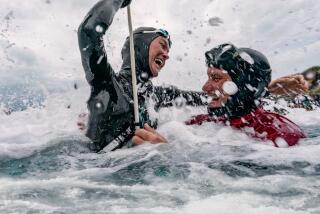Risk Management : A Thrill-Seeker and a Tamer Mate Can Keep Excitement Without Endangering Love, Orange County Therapists Say
- Share via
The day after Marc Whisan and Rita Keck had their first date, Whisan went hang-gliding. Despite being an experienced glider pilot with more than 17 years’ experience, Whisan crashed and was hospitalized for a week.
“I thought, ‘Maybe this guy’s a masochist,’ ” Keck says. “I couldn’t understand why anyone would get involved in a sport that could kill them.”
She also didn’t understand how Whisan had the nerve to get back in the air after he recovered, but she accepted it.
Three years later, the Long Beach couple are living together and plan to marry.
But no, they won’t be taking a hang-gliding honeymoon into the sunset. Keck accepts her fiance’s love of hang-gliding, but she won’t try it. “I can’t imagine doing it; I’d be too scared.”
Keck and Whisan are just one of many couples who have faced a sometimes difficult conflict in their relationship: When one partner is involved in a risky, thrill-seeking sport and the other has an aversion to it.
“Hang-gliders say that ‘air-induced divorce’ is common,” says Betty Pfeiffer of High Energy Sports in Santa Ana, which sells hang-gliding equipment.
One way to combat that, Pfeiffer says, is to get your partner involved. “The non-flying partner might be a driver, trying to track down the other person so they’ll be around when they land,” she says. “But some people get tired of that very quickly.”
Says Keck: “I really enjoy driving for Marc. I got my ham radio license so I can communicate with him, and it’s kind of adventurous being in a remote place and getting directions from the air, like a treasure hunt.”
Whisan says he enjoys hang-gliding more now that his fiancee is involved, even if she isn’t in the air with him. “She won’t even ride tandem with me, but that’s OK. She’s just not comfortable with it, and I accept that.”
Related conflicts can also be difficult to resolve.
“The partner who’s involved in the activity has to be reasonable about the time and expense of the sport,” says Theresa Lavenau, a marriage, family and child counselor in Huntington Beach. “They need to nurture and make special time for the relationship; you don’t want the other partner to feel abandoned.”
“In that kind of situation, it’s important for each person to respect the other’s position,” says Teri Wright, a psychologist based in Orange. “You need to meet in the middle.”
Bonnie Keith didn’t understand husband David’s love of sky-diving. “I wanted to see why he loved it, so I jumped with him. I’m glad I did it, but I’ll never do it again.”
The Laguna Hills couple took a tandem jump, where the two were connected to one large parachute. “My biggest fear was leaving the plane, but I don’t remember doing that,” she says.
Her husband, who is also an aerial photographer, has a picture of their only sky-dive as a couple. “I’m glad she went with me to see what it was like; it gave her an idea of why I do it.”
For David Keith, sky-diving is “like a drug. Anytime you do something exhilarating, you can feel the adrenaline pumping through your body; it’s like an addiction. If I haven’t jumped for a few weeks, and I get in a bad mood around the house, Bonnie will tell me go take a jump. When I come back, I’m a different person.”
Married for seven years, the Keiths made a pact before they took their vows regarding David’s sky-diving. “She agreed not to interfere with this. I said that I love her, and I love the sky, but it’s not the same kind of love.”
For couples in an unhealthy relationship, being torn between these two loves isn’t good news. “In some cases, the sport can become a mistress,” Lavenau says. “One partner becomes consumed by an activity to avoid the relationship and keep from getting too close.”
When Doreen Kay of Anaheim learned to scuba dive 10 years ago, she found a fascinating world to explore--one that didn’t include her then-husband.
“He hated swimming, and he laughed when I’d go off scuba diving; that may be why I took to it so well. It felt so free to have a skill that he couldn’t grasp, to be able to explore someplace he couldn’t get to. After about a year of this, I realized scuba was ending my marriage, but I didn’t care.”
The school administrator met her present husband, Robert, on a diving trip to Mexico. He doesn’t dive either. “It would scare the daylights out of me,” Robert Kay says. “When I think of diving, all I can imagine is ‘Sea Hunt,’ and people were always dying underwater on that show.”
“It doesn’t bother me at all that Robert doesn’t dive,” Doreen Kay says. “I dive with a group of people, and we have fun in the water, and Robert joins us afterward. I know he worries about me, but he also knows that I don’t take chances when I dive.”
The fear that comes from having a loved one participate in a potentially fatal activity isn’t easy to shake and can become a critical issue in the relationship.
“Being concerned about a loved one’s safety is good; that’s something positive,” Wright says. “It’s up to the partner involved in the sport to show that all safety precautions are being taken.”
However, no matter how careful someone may be, accidents happen. After their relationship started getting serious and Keck began learning about hang-gliding, Whisan had another bad accident.
“I was the only person around when he crashed, so I had to call in the rescue team. It was a horrible experience,” Keck says. “At that point I told him, ‘You stop hang-gliding, or we split up.’
“As we both recovered from the accident, we got our sensibilities back. Marc resolved that he would continue hang-gliding, but he would be even more careful than he was before,” she says.
Keck rationalizes that it’s not necessarily the activity that creates accidents, it’s the person involved. “So much depends on the pilot. If he or she is skilled, conscientious and takes care of their equipment, they’re not as likely to get hurt as someone who is careless. After Marc was determined to fly again after his second accident, it was clear to me that he wasn’t going to give it up, and if I wanted to be with him, I’d have to accept his hang-gliding.”
Bonnie Keith also witnessed an accident involving her husband. A plane David was taking for a jump crashed on takeoff, and the divers had to run through a wall of fire to safety.
“It was a nightmare, but everything turned out OK. There’s always a certain fear and anxiety I feel when he jumps. My last words to him before he goes are ‘Be careful,’ ” she says. “That’s kind of a ritual for us.”
Adds David: “If she forgets after I leave the house, she always calls to tell me to be careful.”
For many couples, the fear of injury or the monopolization of time and money tears the thrill-seeking partner away from the sport, or the relationship. “I have brothers who got involved in sky-diving and liked it; then they got married and they quit,” David says.
“When a sky-diver gets into a relationship with someone who doesn’t jump, you’ll usually see that person jump less and less until they stop altogether, or they keep on jumping and you see the relationship break up,” he says. “It takes something special between two people to make a situation like this work.”
Bonnie Keith helps cope with her husband’s sky-diving by getting involved in her own activities. “I love to do country line dancing, which is something he has no interest in. So he’ll do his thing and I’ll do mine, and neither of us feels like we’ve been abandoned.”
For Keck and Robert Kay, learning about their partner’s sport has helped them live with the situation.
“I’m involved in our hang-gliding club, and I’m as active in the sport as I can without getting in the air,” Keck says. “I learn about the equipment and procedures, which makes me feel better about his safety, and the excitement he feels rubs off on me, so I feel a part of the sport.”
Says Robert Kay: “I’ve gone to classes with Doreen to learn about diving, and I’ve talked to a lot of teachers. Now I know that diving is a lot safer than I thought it was.”
However, he still doesn’t think he’ll try going under. “The closest I’ll get to scuba diving with Doreen is watching ‘Jacques Cousteau’ together on TV. You see the same things, and there are no sharks behind the couch.”


